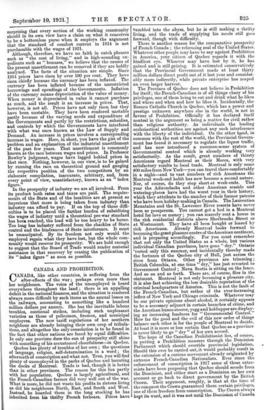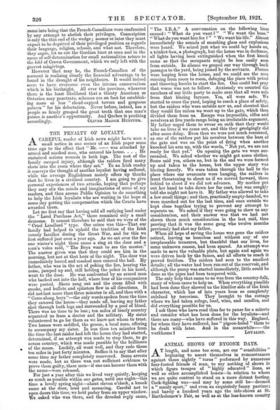CANADA AND PROHIBITION.
CANADA, like other countries, is suffering from the after-effects of the war • perhaps even more than her neighbours. The voice of the unemployed is heard everywhere throughout the land ; there is an appalling deficit in the national finances, and the situation is rendered always more difficult by such items as the annual losses on the railways, amounting to something like a hundred million dollars per annum. She has the inevitable labour troubles, continual strikes, including such unpleasant varieties as those of policemen, firemen, and municipal employees. The new tariff regulations of her southern neighbour are already bringing their own crop of tribula- tions, and altogether the only consolation is to be found in the-fact that other nations are faced by equal difficulties. In only one province does the sun of prosperity still shine with something of his accustomed cheerfulness—in Quebec. Quebec has plenty of troubles of her own ; the questions of language, religion, self-determination in a word • the aftermath of conscription and what not. True, you will find Plenty of unemployed in the parks of Quebec and haunting the docks of Montreal. Trade is bad, though it is better than in other provinces. The reason for this lies partly with her population. Quebec is largely agricultural, and the French-Canadian farmer did very well out of the war. What is more, he did not waste his profits in riotous living as did his neighbours North, East, and South and West. Instead, he hoarded them in the long stocking he has inherited from his thrifty French forbears. Prices have tumbled into the abyss, but he is still making a thrifty living, and the trade of supplying his needs still goes forward, though with difficulty. There is another reason for the comparative prosperity of French Canada ; the reforming zeal of the United States. Whatever other people may have to say against Prohibition in America, your citizen of Quebec regards it with the kindliest eye. Whoever may have lost by it, he has gained and is still gaining. It is estimated conservatively that the Provincial Government made at least thirty million dollars direct profit out of it last year and consider- ably more indirectly, while private enterprise has reaped an even larger harvest. The Province of Quebec does not believe in Prohibition for itself ; the French-Canadian is of all things chary of his privileges, one of them being to eat and drink what he likes and where and when and how he likes it. Incidentally, the Roman Catholic Church in Quebec, which has a power and prestige unknown anywhere else in the world, is not in favour of Prohibition. Officially it has declared itself neutral in the argument as being a matter for civil rather than religious authority. As individuals the leading ecclesiastical authorities are against any such interference with the liberty of the individual. On the other hand, in common with the rest of the world, the Provincial Govern- ment has found it necessary to regulate the liquor traffic, and has now introduced a common-sense system of Governmental control which is already working very satisfactorily. As the result, great numbers of thirsty Americans regard Montreal as their Mecca, with very satisfactory results to local trade. Montreal is only some 400 miles from New York—you can travel there comfortably in a night—and to vast numbers of rich Americans the Montreal week-end habit has now become a second nature. Nor, of course, do they stop short at week-ends. This year the Adirondacks and other American seaside and watering-places have had the worst year in their history, which they attribute to the number of their former patrons who have been holiday-making in Canada. The Laurentian Mountains and the St. Lawrence River resorts have never been so prosperous. You cannot get a bed in a Montreal hotel for love or money ; you can scarcely rent a house in the rich residential districts above Sherbrooke Street or at Westmount. They have all been bought or leased by rich Americans. Already Montreal looks forward to becoming the great pleasure centre of theAmerican continent, and is preparing accordingly. For you must remember that not only the United States as a whole, but various individual Canadian provinces, have gone " dry." Ontario 'verted only this summer, and incidentally thereby made the fortunes of the Quebec city of Hull, just across the river from Ottawa. Other provinces are trimming ; British Columbia, at one time " dry," has just reverted to Government Control ; Nova Scotia is sitting on the fence. And so on and so forth. There are, of course, flies in the ointment. Montreal is not only becoming a pleasure city, it is also fast achieving the less desirable reputation of the criminal headquarters of America. This is not the fault of the French-Canadian, but rather of the ever-increasing influx of New York and Chicago criminals. Whatever may be our private opinions about alcohol, it certainly appears to be a necessary adjunct in certain branches of crime, and the American bunco steerer, yegg and holdupper are display- ing an increasing fondness for " Governmental Control." How far the good and the evil of this new order of things balance each other is for the people of Montreal to decide. At least it is more or less certain that Quebec as a province is never likely to go " dry " of her own accord. The hope of the Canadian Prohibitionist lies, of course, in putting a Prohibition measure through the Dominion Parliament which should override provincial - Should this ever be carried out, it would probably result in the extension of a curious movement already originated by extreme French-Canadian Nationalists. Ever since the enforcement of conscription in 1917 some of these extre- mists have been proposing that Quebec should secede from the Dominion, and either start as a Dominion on her own account or go back to direct government by the British Crown. Their argument, roughly, is that at the time of the conquest the Crown guaranteed them certain privileges, one of them freedom from conscription. The Crown always kept its word, and it was not until the Dominion of Canada came into being that the French-Canadians were confronted by any attempt to abolish their privileges. Conscription is only the thin end of the wedge ; sooner or later they must expect to be deprived of their privileged position as regards their language, religion, schools, and what not. Therefore, they argue, let us cut the Gordian knot at once and in the name of self-determination for small nationalities return to the fold of Crown Government, which we only left with the gravest misgivings. However that may be, the French-Canadian of the moment is realizing clearly the financial advantage to be found in the drought of his neighbours. It would indeed seem to have overcome even the intense conservatism which is his birthright. All over the province, wherever there is the least likelihood that a thirsty American or Ontarian may penetrate, schemes are on foot for establish- ing more or less " cloud-capped towers and gorgeous palaces " for his delectation. Never before, indeed, has a people so firmly grasped the great truth that one man's poison is another's opportunity. And Quebec, is profiting



































 Previous page
Previous page